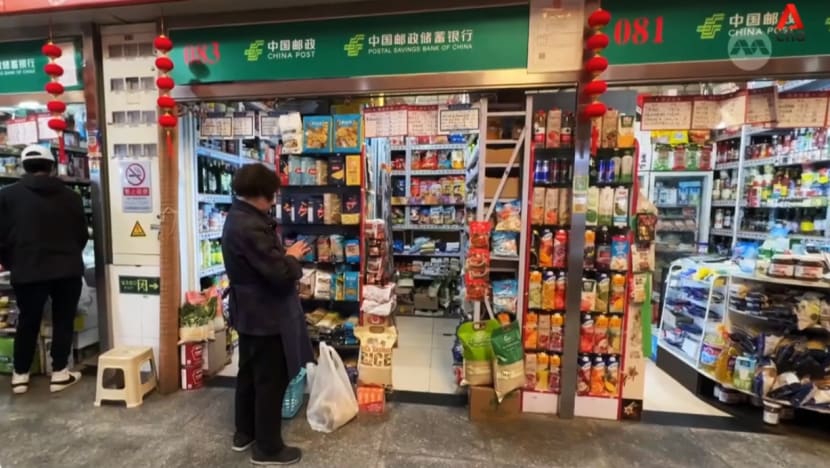Small businesses in China fret over US tariffs, look to manage costs
As US imports become more expensive, Chinese shopowners are seeking alternatives to mitigate the impact.

Store owner Peng Binglan stands outside her shop, which carries imported US products, at Sanyuanli market in Beijing.

This audio is generated by an AI tool.
BEIJING: Small business owners are reassessing their import options and scrambling to manage costs as they brace for impact from a brewing trade war between the United States and China.
US President Donald Trump has slapped a 145 per cent tax on Chinese goods in what he calls reciprocal tariffs to close a trade deficit, and Beijing has retaliated with a 125 per cent levy on US imports.
The tit-for-tat tariffs are raising alarm among Chinese businesses that deal with American goods, as import costs soar.
Many are worried customers will shun the now pricier items, leading to reduced earnings.
On a broader note, they are concerned the tariff war would hit the economy, affecting the job market and causing consumers to spend less.
“Their spending power will go down,” said Meng Kaidong, a bar owner in Beijing. “For example, someone who used to spend over 200 yuan (US$27) at the bar might now only spend a bit over 100 yuan.”
Meng, who serves American whiskeys on his menu, said he is unlikely to import more once they are sold out. Instead, he will replace them with European or homegrown brands that are set to enter the market in the next few years.
Still, he is confident that the impact would not be too severe, saying Chinese industries are well-developed across the board.
“We can produce a lot of things ourselves, so I think it’s manageable,” said Meng.
The impact of the tariff war is also keenly felt at the Sanyuanli market in Beijing, which sells imported goods and caters to expatriates.
Store owner Peng Binglan said she will be forced to stop selling imported US flour in her shop, as her supplier is not replenishing the stock.
“If things keep going like this, a lot of people, including us, will not be able to stay. We just will not be able to keep working,” said Peng, who has been peddling her wares at the market for 18 years.
DIVERSIFYING TO OTHER MARKETS
China’s economy was already grappling with a host of structural challenges before the tariff shock.
While the country achieved its 2024 growth target, with the economy expanding by 5 per cent, consumers have been reluctant to spend amid a prolonged housing crisis and rising unemployment.
The steepened US tariffs will also hit Chinese exporters hard, forcing them to diversify to other markets to mitigate the impact.
“Europe and Japan are the economies that are meaningful – big enough, sizable enough to absorb China's excessive consumer goods exports,” said Yue Su, principal economist for China at the Economist Intelligence Unit.
Yue said that China needs to consider enhancing ties with those two economies to increase their imports of Chinese products.
Chinese President Xi Jinping appeared to extend an olive branch to Europe when he hosted Spanish Prime Minister Pedro Sanchez in Beijing on Apr 11.
Xi emphasised that China and the European Union must stand against “tariff bullying”, while calling on the West to support multilateralism and open cooperation.
China is also eager to strengthen economic relationships with South Korea and Japan, with state media talking up trilateral trade ties after a high-level meeting in Seoul in March.

















